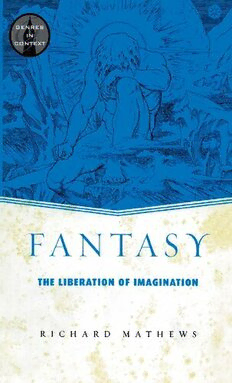
Fantasy: The Liberation of Imagination PDF
Preview Fantasy: The Liberation of Imagination
FANTASY THE LIBERATION OF IMAGINATION GENRES IN CONTEXT TIlE SHORT STORY The Reality of Artifice Charles E. May FAl';lASY The Liberation of Imagination Richard Mathews BIOGRAPHY Writing Lives Catherine N. Parke THE SEA VOYAGE NARRATIVE Robert Foulke SCIENCE FICTION BEFORE 1900 Imagination Discovers Technology Paul K. Alkon SCIENCE FICTION AFTER 1900 From the Steam Man to the Stars Brooks Landon NATCRE WRITING The Pastoral Impulse in America Don Scheese TIlE FAIRY TALE The Magic Mirror of Imagination Steven Swann Jones TRAVEL WRITING The Self and the World Casey Blanton FANTASY THE LIBERATION OF IMAGINATION Richard Ma\hews -R ~~~tI,!l.~ ,.,. ..., """""" First Routledge paperback edition 2002 This edition published 2011 by Routledge 711 Third Avenue, New York, NY 100l7, USA 2 Park Square, Milton Park, Abingdon, Oxon, OX14 4RN Routledge is an imprint of the Taylor & Francis Group. Originally published in hardcover by Twayne Publishers, an imprint of The Gale Group. This paperback edition published by arrangement with Twayne Publishers. Copyright © 1997 by Twayne Publishers All rights reserved. No part of this book may be reprinted or reproduced or utilized in any form or by any electronic, mechanical, or other means, now known or hereafter invented, including photocopying and recording, or in any information storage or retrieval system, with out permission in writing from the publisher. Cataloging-in-Publication Data available from the Library of Congress. ISBN 0-415-93890-2 (pbk) For Emily and Joseph, who opened my eyes to new readings In every cry of every man, In every Infant's cry of fear, In every voice, in every ban, The mind-forged manacles I hear. -William Blake, "London," 1794 General Editor's Statement Genre studies have been a central concern of Anglo-American and European literary theory for at least the past quarter cen tury, and the academic interest has been reflected, for example, in new college courses in slave narratives, autobiography, biogra phy, nature writing, and the literature of travel as well as in the rapid expansion of genre theory itself. Genre has also become an indispensable term for trade publishers and the vast readership they serve. Indeed, few general bookstores do not have sections devoted to science fiction, romance, and mystery fiction. Still, genre is among the slipperiest of literary terms, as any examina tion of genre theories and their histories will suggest. In conceiving this series we have tried to avoid, on the one hand, the comically pedantic spirit that informs Polonius's recita tion of kinds of drama, and on the other hand, the equally unhelpful insistence that every literary production is a unique expression that must not be forced into any system of classifica tion. We have instead developed our list of genres, which range from ancient comedy to the Western, with the conviction that by common consent kinds of literature do exist-not as fixed cate gories but as fluid ones that change over time as the result of the complex interplay of authors, audiences, and literary and cultural institutions. As individual titles in the series demonstrate, the idea of genre offers us provocative ways to study both the conti- Vll FANTASY nuities and adaptability of literature as a familiar and inex haustible source of human imagination. Recognition of the fluid boundaries both within and among genres will provide, we believe, a useful array of perspectives from which to study literature's complex development. Genres, as traditional but open ways of understanding the world, con tribute to our capacity to respond to narrative and expressive forms and offer means with which to discern moral significances embodied in these forms. Genres, in short, serve ethical as well as aesthetic purposes, and the volumes in this series attempt to demonstrate how this double benefit has been achieved as these genres have been transformed over the years. Each title in the series should be measured against this large ambition. Ron Gottesman Vlll Contents Preface xi Acknowledgments xiii Chronology xv Chapter 1 From Antiquity to Infinity: The Development of Modern Fantasy 1 Chapter 2 Forging Fantasy Paradigms: Sword Tempered by Water (William Morris's The Well at the World's End) 37 Chapter 3 Shaping Modern Fantasy: Cosmic Light and Dark 0. R. R. Tolkien's The Lord of the Rings) 54 Chapter 4 Plotting the Modern Mythic Hero: Morris and Tolkien 85 Chapter 5 Shining Past and Future: The Persistence of Camelot (T. H. White's The Once and Future King) 96 lX
